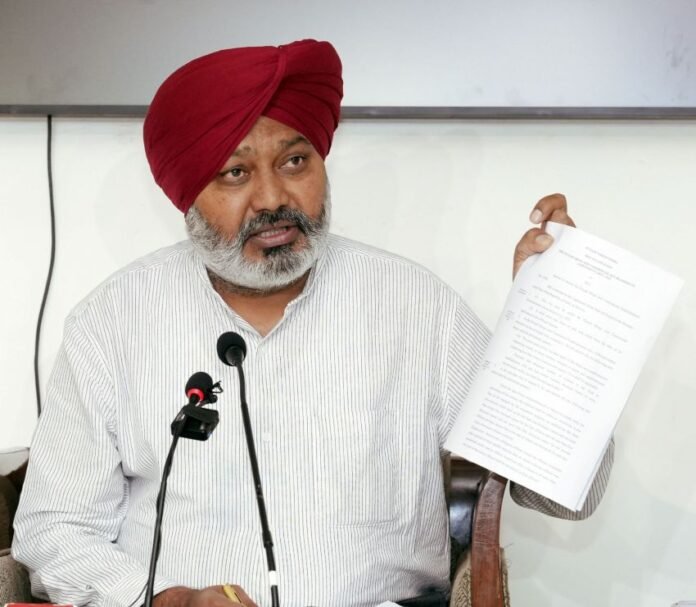In a rare and remarkable event in Punjab’s political history, the just-concluded session of the Punjab Vidhan Sabha witnessed the unanimous passage of every bill, act, and resolution presented by the Chief Minister Bhagwant Singh Mann-led Aam Aadmi Party (AAP) government. Described as an “extraordinary and historic milestone” by Finance Minister Advocate Harpal Singh Cheema, the outcome is being hailed as a strong endorsement of the government’s transparent, inclusive, and people-centric governance model.
Addressing a press conference at Punjab Bhawan, Finance Minister Cheema emphasized the significance of such unanimous legislative consensus. Having served two terms in the state assembly, he remarked that this was the first time he had witnessed a session where even opposition parties unanimously agreed on all critical legislative matters, signalling a new era of constructive dialogue and governance.
The session was originally slated for a shorter duration, but was extended by two days right from the onset to facilitate detailed and comprehensive discussions. According to Cheema, this extension was a deliberate decision to encourage meaningful participation by opposition members and ensure that every bill underwent in-depth scrutiny. “Such openness and democratic engagement mark the beginning of a transformative period in Punjab’s legislative history,” he said.
One of the most significant moments during the session was the unanimous decision to refer “The Punjab Prevention of Crime Against Religious Scriptures Bill, 2025” to a select committee. This bill, which aims to put in place stringent measures against the desecration of any religious scripture, received special attention. The fact that it was sent for further discussion underscores the AAP government’s commitment to crafting well-rounded and robust legislation that protects the sentiments of all religious communities while being inclusive and forward-thinking.
In another critical development, a resolution opposing the deployment of Central Industrial Security Force (CISF) personnel at Bhakra Beas Management Board (BBMB) installations was passed without dissent. Introduced by Water Resources Minister Barinder Goyal, the resolution questioned the earlier Congress-supported move to allow CISF deployment, which Cheema criticized as a political compromise involving the BJP-led Centre and Haryana government. He stated that for over 70 years, Punjab Police had provided flawless security to BBMB facilities, with no recorded breach. That the Congress Party now reversed its stance and supported the AAP government’s resolution was acknowledged as a constructive gesture and an example of collaborative leadership.
In the education sector, the assembly unanimously passed the “Rayat Bahra Professional University, Hoshiarpur Bill-2025” and the “CGC University, Mohali Bill-2025.” These bills aim to reinforce Punjab’s academic infrastructure and improve access to higher education. Cheema underscored that such institutions will play a pivotal role in equipping youth with future-ready skills, especially as the state aspires to become a knowledge and innovation hub.
The “Punjab Shops and Commercial Establishments Bill, 2025” marked a groundbreaking reform in labor and trade regulation. Passed with unanimous support, the bill eliminates outdated provisions dating back to 1958 and specifically targets the dismantling of ‘inspector raj’ — a system that often subjected small businesses to regulatory harassment. With this reform, Punjab’s entrepreneurs, especially shopkeepers and micro enterprises, are expected to operate in a more dignified and streamlined environment.
Equally impactful was the passage of “The Punjab Labor Welfare Fund Bill, 2025,” designed to strike a delicate balance between the ease of doing business for employers and the welfare of workers. The amendments to the fund’s framework reflect the government’s nuanced understanding of industrial needs, signaling a maturity in economic policymaking that transcends traditional political divides.
Culturally, the unanimous approval of “The Prevention of Cruelty to Animals (Punjab Amendment) Bill, 2025” was celebrated for its recognition of Punjab’s rural heritage. The bill permits the revival of traditional bullock cart races at Kila Raipur—an iconic event that blends sport with cultural identity—under regulated conditions. In doing so, the assembly reaffirmed its commitment to preserving Punjab’s folk traditions while ensuring humane treatment of animals.
From his own department, Minister Cheema introduced and saw the unanimous passage of two additional finance-related bills. “The Punjab State Development Tax (Amendment) Bill, 2025” incentivizes taxpayers by offering a ₹200 discount on lump-sum annual payments, streamlining collections and encouraging voluntary compliance. Meanwhile, “The Punjab Appropriation (Repeal) Bill, 2025” was passed to eliminate outdated appropriation laws dating back to 1985, further demonstrating the government’s drive toward administrative efficiency and legal modernization.
The session also featured a robust debate and a rare show of unity on the issue of drug abuse in the state. In a session dedicated to the ‘Yudh Nashian Virudh’ campaign (War Against Drugs), members across the political spectrum pledged support to eliminate the menace of narcotics from Punjab. Minister Cheema called this commitment “a moral imperative” that transcends politics, describing the assembly’s unified voice on this front as a beacon of hope for the state’s youth.
Observers note that the unanimous passage of such a wide range of bills—from religious protections and labor reforms to education expansion and drug eradication—signals a maturing of Punjab’s legislative process. It also illustrates the AAP government’s ability to build consensus around reform-oriented policies without undermining democratic debate.
At a time when political polarization dominates much of India’s legislative spaces, Punjab’s Vidhan Sabha has offered a rare example of cohesive governance, where legislative integrity and bipartisan cooperation converged for the collective good.
#PunjabVidhanSabha #AAPGovernment #HarpalCheema #PunjabReforms #UnanimousBills #PunjabEducation #AntiDrugCampaign #InspectorRajAbolished #BBMBResolution #PunjabCultureRevived #GovernanceSuccess
This is a web generated news report.





